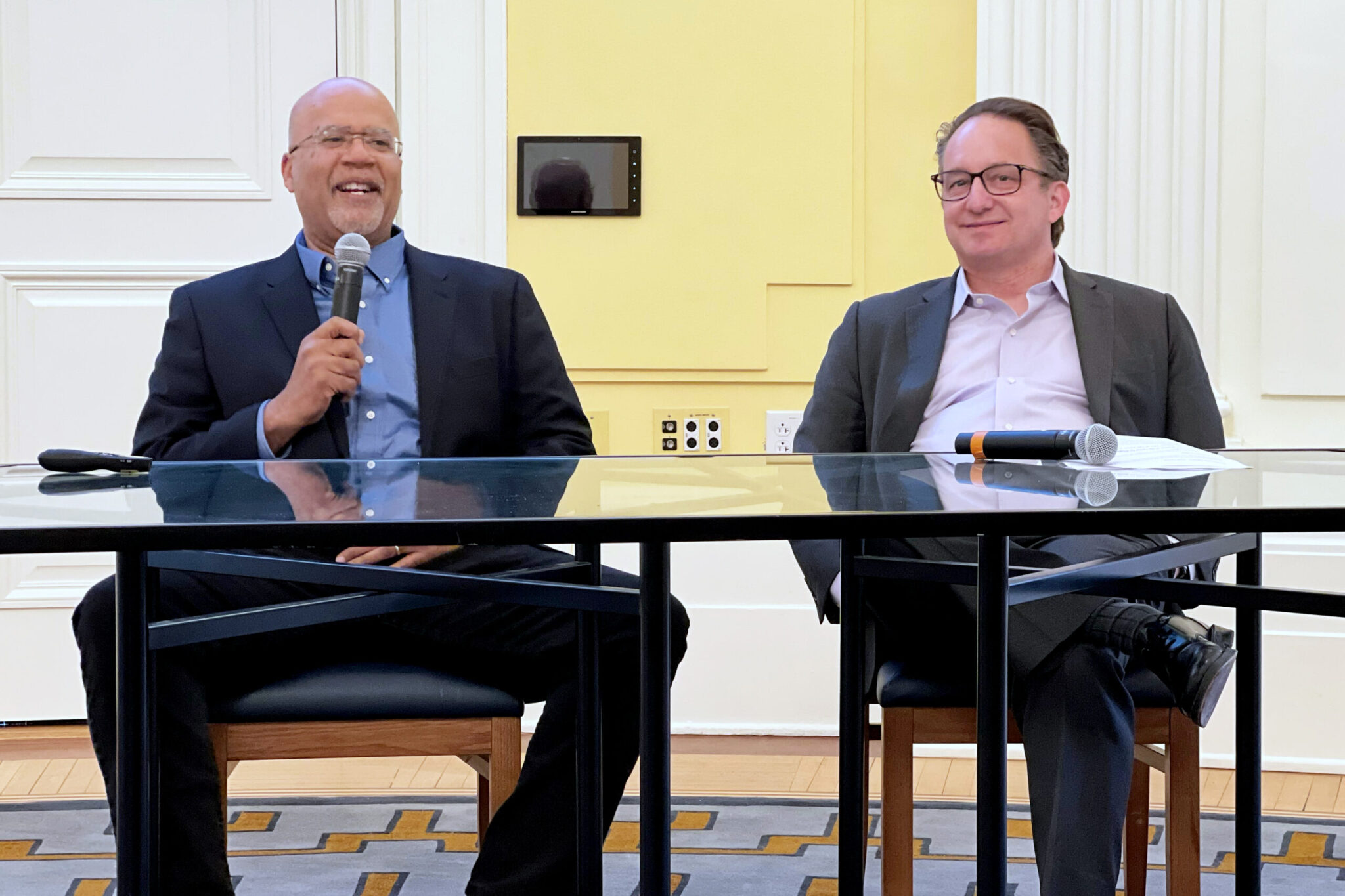Virologist Paul Turner speaks at “Dean’s Dialogue” talk
In the latest installment of the Dean's Dialogue Series, Yale College Dean Pericles Lewis and Paul Turner discussed “Understanding Virus Evolution to Solve Human Problems”.

Adam Walker, Contributing Photographer
Yale College Dean Pericles Lewis and Paul Turner led a conversation exploring how the study of virus evolution can provide solutions to humanity’s problems in the President’s Room at the Schwarzman Center on March 1.
Turner, who currently directs both the Center for Phage Biology and Therapy and the Quantitative Biology Institute at Yale, was invited to speak in the latest installment of the “Dean’s Dialogue” series. The series invites faculty members to speak with Lewis and students about contemporary and often-challenging topics within their field of study. One of the series’ goals is to model conversation as a mode of engagement.
Wednesday’s talk was titled “Understanding Virus Evolution to Solve Human Problems.” Lewis and Turner discussed the replication and evolutionary potential of viruses, as well as their prevalence in the biosphere. The topic was chosen to highlight the challenge of disease-causing viruses and how they could potentially affect the future.
“Generally what [viruses] do is interact with the cell, whether it’s in your own body, or in the body of some other organism, and [viruses] replicate,” Turner said. “[Viruses] interact with the cell itself with cell machinery, make copies, and those copies can go on to infect other cells.”
According to Turner, viruses seem to affect all kinds of cellular life, whether it be tiny bacteria or the largest known organism inhabiting the Earth, the blue whale.
Turner said that his studies of evolution and viruses go hand in hand because viruses have “amazing evolutionary potential.” Viruses are good at what they do and can improve through evolution, he said, over time becoming more effective at attaching themselves to other beings, growing and transmitting information between cells.
The problem of disease-causing viruses that come from animals is an interesting one from the standpoint of biology and a frustrating one from the standpoint of humanity, according to Turner. He explained that many people interact closely with animals either in their homes or at work, which can spark questions about how viruses first emerge and how they are passed between species.
“Viruses infect cells, but they do not have cells,” he said. “They’re basically DNA, RNA, nucleic acid or protein. They’re different from cells, and therefore you can’t consider them as living, and that is an ongoing debate. What I’m here to tell you today is that [viruses] are the most plentiful thing in the biosphere. On the planet, there are more viruses than anything else.”
At Wednesday’s talk, Turner also discussed how viruses can be utilized to address human problems. He said that antibiotics, which kill diseases that are caused by bacteria, are beginning to work less effectively. Turner shared that experts predict that in a couple of decades, antibiotic-resistant bacterial infections will be prevalent and a leading cause of death in humans, exceeding even cancer. In essence, the drugs that we rely on to treat bacterial infections will not work in the future.
He explained that viruses have the potential to help solve the looming problem of antibiotic resistance. Viruses, according to Turner, could be useful as a method to kill the disease agent itself. One example Turner gave was a virus that could be modified to specifically target cancer cells.
Lewis initiated a question and answer session after Turner had introduced the subject, inquiring into what had inspired Turner’s fascination with viruses.
Turner said that despite growing up loving biology, he is surprised that he ended up as a microbiologist. When he was a kid, he loved to memorize picture books of animal life, especially mammals and other creatures. When he went to graduate school, his advisor talked to him about how powerful microbes could be used to study evolution.
Lewis then turned the conversation toward the video game and new HBO show “The Last of Us,” which is about a mutant fungus that transforms its human hosts into cannibalistic monsters. He asked Turner if there was a possibility of this scenario ever happening in real life. Turner said that though it is highly unlikely for a virus to turn humans into zombies, there are no antiviral therapies that treat fungal infections, so a zombie apocalypse of such a type would be difficult to contain.
After Lewis finished his initial round of questions, he opened up the discussion to members of the audience.
“I wanted to ask about the typical spectrum of individual families of phages as opposed to classes of antibiotics that can be either broad or narrow,” said Zara Ranglin ’25, a sophomore studying molecular, cellular and developmental biology who attended the event.
Turner explained that one of the downsides of the broad spectrum of antibiotics is that they kill other bacteria unnecessarily. When antibiotics are used to treat bacterial infections, they not only target the bacteria that are causing the infection but also other bacteria that may be present in the body — essentially resulting in collateral damage.
The event concluded with a reception, where attendees enjoyed refreshments and had the opportunity to engage with Turner directly and pose any remaining questions they may have had.
Turner received his bachelor’s degree in biology at the University of Rochester.







